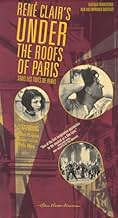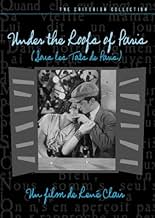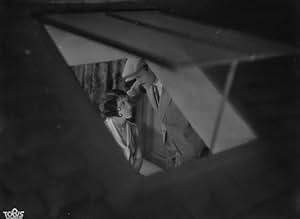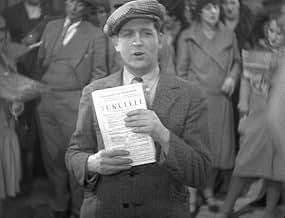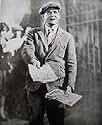VALUTAZIONE IMDb
7,0/10
2603
LA TUA VALUTAZIONE
Aggiungi una trama nella tua linguaAlbert is smitten for Pola but ends up wrongly committed in jail, in the meantime her affections are sought after by his friend, and on his release both love and friendship must be tested.Albert is smitten for Pola but ends up wrongly committed in jail, in the meantime her affections are sought after by his friend, and on his release both love and friendship must be tested.Albert is smitten for Pola but ends up wrongly committed in jail, in the meantime her affections are sought after by his friend, and on his release both love and friendship must be tested.
- Regia
- Sceneggiatura
- Star
- Premi
- 1 vittoria in totale
Edmond T. Gréville
- Louis
- (as Edmond Gréville)
Delphine Abdala
- La buraliste
- (non citato nei titoli originali)
Raymond Aimos
- Un gars du milieu
- (non citato nei titoli originali)
Raymond Blot
- Un membre de la bande à Fred
- (non citato nei titoli originali)
Thomy Bourdelle
- François
- (non citato nei titoli originali)
Léon Courtois
- L'inspecteur
- (non citato nei titoli originali)
Édouard Francomme
- Un membre de la bande à Fred
- (non citato nei titoli originali)
André Michaud
- Un agent
- (non citato nei titoli originali)
Jane Pierson
- La dame du premier
- (non citato nei titoli originali)
Louis Pré Fils
- Le locataire du troisième
- (non citato nei titoli originali)
Eugène Stuber
- Un membre de la bande à Fred
- (non citato nei titoli originali)
Louis Zellas
- Le consommateur jaloux
- (non citato nei titoli originali)
Recensioni in evidenza
"Sous les toits de Paris", a 1930 comedy/drama was René Clairs first venture into sound film making - and is already a masterful showcase for the use of sound. It is actually a blend between silent movie and talking movie with whole sections being without any sound or the dialogue turned off. In its deliberate use of sound, the movie reminded me of Fritz Lang's "M".
Also, the sets are fantastic. They show the "lower" quarters of Paris as both a fantastic place and a realist place. It gives the movie a very nice touch.
But the story isn't that fantastic. It's a simplistic plot about a man falling in love. He's getting arrested. In the meantime, his best friend falls in love with his girl. I think Clair wasn't out to write something terribly new but used this simple, yet lovely story to carry his technical idea about sound (he was at that time still a strong defender of the silent cinema). Also, he wanted to show the "other" life in Paris, the low life. And he succeeds quite well at that.
All that said, however, I have to add that this isn't my kind of film. I appreciate its virtuoso style for its time, I even might consider it a classic to some extend because it led the way for a generation of film makers - but personally, it doesn't do much for me. I watch it sort of emotionless. Overall, I'd give it a very personal
6/10
Also, the sets are fantastic. They show the "lower" quarters of Paris as both a fantastic place and a realist place. It gives the movie a very nice touch.
But the story isn't that fantastic. It's a simplistic plot about a man falling in love. He's getting arrested. In the meantime, his best friend falls in love with his girl. I think Clair wasn't out to write something terribly new but used this simple, yet lovely story to carry his technical idea about sound (he was at that time still a strong defender of the silent cinema). Also, he wanted to show the "other" life in Paris, the low life. And he succeeds quite well at that.
All that said, however, I have to add that this isn't my kind of film. I appreciate its virtuoso style for its time, I even might consider it a classic to some extend because it led the way for a generation of film makers - but personally, it doesn't do much for me. I watch it sort of emotionless. Overall, I'd give it a very personal
6/10
The great French film actor Jacques Tati made several films that tried to capture a Paris that disappeared even before World WarII. It was a world best seen through the gifted photography of Atget and Brassai. A world of intimacy, silent streets, virtually no traffic, limited means, but unlimited pleasures. A wonderful opening shot glides across rooftops to join a cluster of ordinary Parisians enjoying a singalong, an odd but compelling precursor of karaoke and rock concerts, but untarnished by special effects or hype. There is a sense that we are witnessing a street version of Lautrec's Moulin Rouge.
The cinematography is extraordinary. It can only be compared to Fritz Lang's "M", or the "Third Man". Very little actually happens and dialogue is used sporadically. Yet we find ourselves caring very much about the people about whom we know so little.
An unforgettable film.
The cinematography is extraordinary. It can only be compared to Fritz Lang's "M", or the "Third Man". Very little actually happens and dialogue is used sporadically. Yet we find ourselves caring very much about the people about whom we know so little.
An unforgettable film.
René Clair's "Sous les toits de Paris" ("Under the Roofs of Paris" in English) manages to strike the right balance between happy and gritty. This jolly musical tells the story of a love affair between street singer Albert and Romanian immigrant Pola. Or at least, they attempt a romance. They're surrounded by all manner of lowlifes. This is not the gay Paree that we expect.
Released when talkies were still in their relative infancy, the movie has sound scenes, but also silent ones. It finds the right balance between them. Moreover, the characters are complex if lowly individuals. Watching it all these years later, I wonder which direction French cinema would've taken had World War II not happened.
Anyway, outstanding movie. Not the greatest by any stretch, but still impressive.
Released when talkies were still in their relative infancy, the movie has sound scenes, but also silent ones. It finds the right balance between them. Moreover, the characters are complex if lowly individuals. Watching it all these years later, I wonder which direction French cinema would've taken had World War II not happened.
Anyway, outstanding movie. Not the greatest by any stretch, but still impressive.
10zetes
René Clair's early sound films are amongst the best ever made. Le Million (1931), Quatorze Juillet (1933), and Under the Roofs of Paris (1930) are masterpieces of musical comedy and romance (I leave out perhaps his most famous, À nous la liberté, which I need to see again). Under the Roofs of Paris is the loose but good story of a young street singer (Albert Préjean) who falls in love with a girl (Pola Illéry). He has an uneasy relationship with a couple of pickpockets (including Gaston Modot, who also made L'Âge d'or with Buñuel the same year) who like to work when he's demonstrating his talent. In the film's opening scene, there is an amazingly edited sequence of one of these men at work. Everyone wants Pola, including Albert's best friend, Louis, and when Albert is framed for burglary, they don't think twice about going after her. Clair's direction moves like silk. It's so supple. The camera movements, full of crane shots and pans, is technically stunning, especially for the time but even now. And the use of sound is absolutely revolutionary. It's more or less half silent, half talkie. Unlike many early sound films, Clair keeps the dialogue to a minimum, so it's never clunky. Characters only speak when they have to; at other times, they gesture. The film is often described as a musical, but it is not. There are two songs, and the music arises diagetically from an accordion player. The music, and the use of music, are quite amazing. This is one of the most wonderful movies ever made.
I'd be lying if I said this didn't surprise me a little bit. In various ways it is, in turn, clever, novel, well done and brilliant, but also sometimes a tad uneven. René Clair's orchestration of shots and scenes as director is outstanding and often kind of ingenious, and the cinematography of Georges Périnal and Georges Raulet could hardly be more vivid and lovely; these are the first facets to catch our attention, in fact. There's also no mistaking how wonderfully crisp the image is on a basic level, and clearly this benefited from preservation efforts that some of its contemporaries didn't enjoy. It also stands out as one of the earliest sound pictures to come out of France, and more than that, Clair dallies with sound in a very playful, atypical manner - declining innate audio at many points underneath the original music, at others possibly spotlighting some sounds and not others that would coincide with action on-screen, and then still using some louder sounds to "cloak" softer ones and thus avoid the need to capture and reproduce every last one. All the while, it's certainly worth noting that 'Sous les toits de Paris' ('Under the roofs of Paris') is marvelously well made in all other regards, with sets, costume design, hair, and makeup that are utterly terrific. The sound design is perhaps imbalanced as it presents, but under the circumstances I think we can forgive the slight deficiency.
The writing is another matter in some measure. By all means, the story is compelling, and ultimately enjoyable and strongly satisfying as a viewer. Broadly speaking the scene writing, dialogue, and characters range from suitable to flesh out the tableau, to excellent. I think this suffers a bit in the details, however. As it happens, like another early French talkie released in 1930, Augusto Genina's 'Prix de beauté,' I think this title has a problem with finding the appropriate tone. 'Sous les toits de Paris' dallies with crime, romance, music, comedy, violence, and drama, and ranges from funny, to heartwarming, to inspiring, while also being unexpectedly dark and dour at new few points, including the ending. It generally seems like the feature builds strength and gels more cohesively as the runtime elapses, but the mood imparted wavers and never quite entirely feels just right. This difficulty is amplified by the peculiar directness of the storytelling, for in some cases it rather comes across that a beat or idea hasn't been meaningfully developed, and is instead just flatly introduced. When the notion of marriage is brought up, for example, it definitely doesn't seem to have received any significant treatment in the narrative, or discussion by the characters; one happily pronounces "I'm getting married," and it is just so - and the cold contrivance of such instances is exemplified in this one when their partner responds to this proclamation with a quizzical expression on their face. Suspension of disbelief takes a hit at such times.
These troubles in writing and/or execution are unfortunate, because the screenplay is mostly quite smart and solid. Clair penned a worthy, engaging tale, and everyone involved put in fine work to bring the movie to vibrant life, particularly concerning that unusual use of sound (in 1930, no less). Such quality certainly includes the cast, all giving swell performances, with Albert Préjean, Pola Illéry, and Edmond T. Gréville naturally standing out giving their prominence, but also in my opinion proving that they deserve it with the skill they demonstrate. While it's regrettable that the whole takes a while to especially come together, had the writing been tightened just a tad the end result would have benefited considerably. With all this said, though, it speaks very well to the capabilities and intelligence of all who participated in the feature's creation that it comes off as well as it does, with value that handily outweighs the weaker facets. Whatever one's impetus for watching and however one comes across 'Sous les toits de Paris' I don't think it's so essential as to fully demand viewership, but it's unquestionably deserving of recognition on its own merits. Don't necessarily feel the need to go out of your way for it, but if you have the chance to watch, this is worth exploring.
The writing is another matter in some measure. By all means, the story is compelling, and ultimately enjoyable and strongly satisfying as a viewer. Broadly speaking the scene writing, dialogue, and characters range from suitable to flesh out the tableau, to excellent. I think this suffers a bit in the details, however. As it happens, like another early French talkie released in 1930, Augusto Genina's 'Prix de beauté,' I think this title has a problem with finding the appropriate tone. 'Sous les toits de Paris' dallies with crime, romance, music, comedy, violence, and drama, and ranges from funny, to heartwarming, to inspiring, while also being unexpectedly dark and dour at new few points, including the ending. It generally seems like the feature builds strength and gels more cohesively as the runtime elapses, but the mood imparted wavers and never quite entirely feels just right. This difficulty is amplified by the peculiar directness of the storytelling, for in some cases it rather comes across that a beat or idea hasn't been meaningfully developed, and is instead just flatly introduced. When the notion of marriage is brought up, for example, it definitely doesn't seem to have received any significant treatment in the narrative, or discussion by the characters; one happily pronounces "I'm getting married," and it is just so - and the cold contrivance of such instances is exemplified in this one when their partner responds to this proclamation with a quizzical expression on their face. Suspension of disbelief takes a hit at such times.
These troubles in writing and/or execution are unfortunate, because the screenplay is mostly quite smart and solid. Clair penned a worthy, engaging tale, and everyone involved put in fine work to bring the movie to vibrant life, particularly concerning that unusual use of sound (in 1930, no less). Such quality certainly includes the cast, all giving swell performances, with Albert Préjean, Pola Illéry, and Edmond T. Gréville naturally standing out giving their prominence, but also in my opinion proving that they deserve it with the skill they demonstrate. While it's regrettable that the whole takes a while to especially come together, had the writing been tightened just a tad the end result would have benefited considerably. With all this said, though, it speaks very well to the capabilities and intelligence of all who participated in the feature's creation that it comes off as well as it does, with value that handily outweighs the weaker facets. Whatever one's impetus for watching and however one comes across 'Sous les toits de Paris' I don't think it's so essential as to fully demand viewership, but it's unquestionably deserving of recognition on its own merits. Don't necessarily feel the need to go out of your way for it, but if you have the chance to watch, this is worth exploring.
Lo sapevi?
- QuizThe opening sequence and the street scenes were filmed in a studio.
- Citazioni
Albert, a young street singer: [On seeing Pola bedding down on his bedroom floor] Okay, take the bed, I'll sleep on the floor.
- ConnessioniFeatured in Les dossiers de l'écran: Boulevard du crépuscule (1969)
I più visti
Accedi per valutare e creare un elenco di titoli salvati per ottenere consigli personalizzati
- How long is Under the Roofs of Paris?Powered by Alexa
Dettagli
- Tempo di esecuzione1 ora 36 minuti
- Colore
Contribuisci a questa pagina
Suggerisci una modifica o aggiungi i contenuti mancanti

Divario superiore
By what name was Sotto i tetti di Parigi (1930) officially released in India in English?
Rispondi


